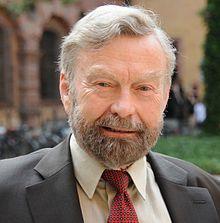Thomas Huxley Quotes - Page 5
Thomas H. Huxley (1900). “A Library of Universal Literature in Four Parts, Comprising Science, Biography, Fiction and the Great Orations”
Science has fulfilled her function when she has ascertained and enunciated truth.
Thomas H. Huxley (2013). “Man's Place in Nature”, p.128, Courier Corporation
If a little knowledge is dangerous, where is the man who has so much as to be out of danger?
'Collected Essays' vol. 3 (1895) 'On Elementary Instruction in Physiology' (written 1877)
"The Coming of Age of 'The Origin of Species' " (1880)
Thomas Henry Huxley (2008). “A Scientific Education”, p.37, Lulu.com
"Huxley: From Devil's Disciple to Evolution's High Priest". Book by Adrian Desmond (p. 253), 1994.
Thomas Henry Huxley (1872). “More Criticisms on Darwin, and Administrative Nihilism”, p.76
Follow humbly wherever and to whatever abyss Nature leads, or you shall learn nothing.
Thomas Henry Huxley (1997). “The Major Prose of Thomas Henry Huxley”, p.359, University of Georgia Press
"Evidence as to Man's Place in Nature". Book by Thomas Henry Huxley. Chapter 2, p. 110, 1863.
Time, whose tooth gnaws away everything else, is powerless against truth.
Thomas Henry Huxley (2011). “Collected Essays”, p.255, Cambridge University Press
What men of science want is only a fair day's wages for more than a fair day's work.
Thomas Henry Huxley (2011). “Collected Essays”, p.287, Cambridge University Press
Thomas Henry Huxley (2008). “A Scientific Education”, p.69, Lulu.com
Thomas Henry Huxley (2004). “Evolution And Ethics”, p.47, 1st World Publishing
Thomas Henry Huxley (1908). “Life and Letters of Thomas Huxley, by His Son, Leonard Huxley”
Thomas Henry Huxley (1997). “The Major Prose of Thomas Henry Huxley”, p.277, University of Georgia Press
Thomas Henry Huxley (2012). “Lay Sermons, Addresses and Reviews”, p.403, tredition
Thomas Henry Huxley (1920). “Readings from Huxley”
Leonard Huxley, Thomas Henry Huxley (2011). “Life and Letters of Thomas Henry Huxley”, p.17, Cambridge University Press
Thomas Henry Huxley (1872). “More Criticisms on Darwin, and Administrative Nihilism”, p.79







